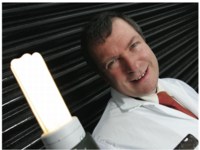E.ON sponsors university research into clean energy

Spearheading research into clean energy technology, Prof. Dennis Loveday of Loughborough University.
New ideas for summertime cooling of buildings are among projects being researched at Loughborough University by a new professorship for innovative energy use sponsored by E.ON. Prof. Dennis Loveday, a leading expert in buildings and their energy systems, has been appointed to the post, which has been established under the Research Chair Scheme of the Royal Academy of Engineering. The research programme focuses on developing new innovative ways of producing, distributing and using energy in a climate-friendly way. The research programme will last five years. During the first year, it will focus on low-energy cooling for buildings. Two projects involve an innovative cooling system installed in ceilings and the use of natural ventilation to control house temperature. Other themes are integrating renewable energy into buildings, IT and intelligent controls for buildings and the impact of climate change on building design, occupier comfort and energy demand. Prof. Loveday says, ‘Collaboration between E.ON, the Royal Academy of Engineering and Loughborough University brings together outstanding expertise to help develop innovative low-carbon energy solutions. Having the opportunity to demonstrate leadership in climate-friendly technologies is also a tremendous recognition of Loughborough University’s capabilities in this vital field, together with those of the region as a whole.’
Related links:


